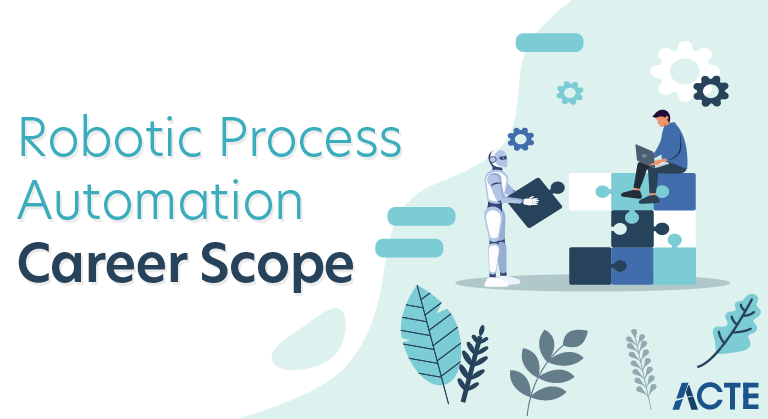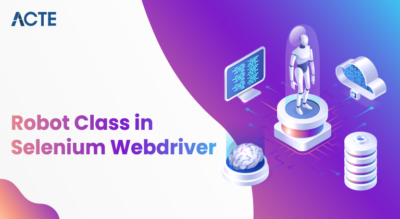
The technology is advancing rapidly in almost all the fields, not in a minute but in every second. With this quick development in technology, tremendous growth has been observed in the global automation industry. The usage of automation techniques is in continuous growth and it is anticipated for the predictable future. The robotic process automation is one of the revolutions in the automation industry, and it is expected to increase higher potential in terms of utilization and staff implementation in the upcoming year. Robotic Process Automation, particularly focuses on the process automation of those industries which are mostly business oriented and are handled by humans. Using RPA, all the operations would be automated easily, but it is expected that it will replace the human jobs because in the future the robotics oriented automated tools will be highly effective.
The robotic process automation is basically a software in which a robot is involved and used to perform human activities. These robots are used to carry out the organizational tasks and they are organized in such a way that they can manage any data or actions for the current applications which are used to carry out several business processes. The robots which are involved in RPA have to be trained and once they are trained, they can be automatically used to carry out the preferred functions. The operations which are automated involves a wide range of manipulation of data, activating responses and improving communications within several systems. The main objective of RPA is to decrease the need for the extra workforce, to carry out the large volume of IT jobs which are related to support the remote infrastructure, workflow, and other back-office processes related to the financial field, accounting, human resources, customer services and supply chain management. With RPA, it is possible to perform the work seamlessly, as it saves a lot of time and also helps to reduce the chances of human errors.The RPA software utilizes multi level features for data collection, configures the digital data and connects it to a server or a website.
Who is an RPA Developer?
RPA Developers are sophisticated designers of automation tasks, with hands-on experience in the top RPA tools of the market. RPA Developers working for enterprises are responsible for problem-solving and design the automation based on the need. Once the automation is designed and rolled into the production, an RPA Developer also needs to make sure that the designed automation is achieving the desired results. So, we can conclude that an RPA Developer can be anyone who has knowledge about Robotic Process Automation and is inquisitive to automate tasks using various tools.
Let us now focus on the job trends of an RPA Developer in various geographies.
Well, the future scope of RPA is relatively very high. There are various human jobs which can be easily automated using RPA tools and technology. The future scope of RPA can be observed in the field of data entry and data rekeying jobs. These tasks could be easily automated with RPA. The various repetitive tasks such as formatting, data assembling or anything which requires a series of steps are easily carried out with the help of RPA. The other computer-supported processes which utilize a set of procedures are also performed through RPA. The RPA would be helpful in improving the data collection and these data can be analyzed in a better way, if all the tasks which are carried out by humans today are performed by robots. During the upcoming year, a tremendous growth is observed in the field of RPA and therefore it will deliver higher technological abilities towards significantly reducing the risk of incorrectly regulatory reporting, including the improved data analytics and higher data accuracy. The RPA in the market is progressing rapidly and acceptance of this robotic automated technique could help to restructure the business process management marketplace. This is due to the following benefits of RPA:
- Efficiency: The software robots are highly efficient and they can operate 24/7 without taking any break.
- Accuracy: In order to carry out data entry tasks, the robots can perform it in the same way as the human beings without making any mistakes.
- Cost Reduction: The software robots help to reduce the organization’s cost.
- Change management can be performed easily by the RPA as it reserves the application and data integrity.
- Enhanced audit and monitoring compliance: A detailed audit log is offered by the robots by allowing advanced business analytics and enhanced compliance.
The RPA’s influence will go to a range within the organizations. Nowadays, most of the organizations are executing RPA to automate their various business processes, its impact will become higher in the future. The RPA will be utilized in different ways and through maximum processes as compared to the present utilization within an organization. RPA will not only focus on its internal processes, in addition to this, it will also be focusing on external as well as customer-oriented processes from now. The incoming email sorting is one of the examples in which the huge productivity can be delivered by the smart robots. This analysis shows that the influence of RPA within the organization would be greater in the forthcoming years than the previous years in terms of overall business. An amount of this will occur when implementation of RPA begins to change from the initial and proof of concept to real production. The RPA is tested in most of the organizations and its usefulness is proved in every situation and thus it can be taken at the succeeding level by most of the businesses. Further innovation can be seen in the RPA area at this stage and new applications would also arise positively.
It has been observed that if any of the automation tools are integrated with other tools it will function flawlessly. The RPA will be utilized with other types of technologies as well because most of the companies realized that the automated tools do not function properly alone but they will give their best results when combined with the other tools. It does not mean that the RPA would not provide appropriate results alone. Definitely, you will get the proper outcomes, the next step is not just to grow the RPA technology alone, but it can be expanded into other tools which the organization is using. The RPA is more versatile, commanding and a big tool, which alone can solve several functions, but the finest consequences would be gained by utilizing the RPA with the other tools. RPA performs the tasks very well on its own, but in the future, those who are practicing the RPA, expect that it will create a more powerful total workforce when it is incorporated with the tasks carried out by human employees. The RPA will be used together with the process and work management tools, that is the tools like Kofax TotalAgility, in which the features like case management is involved.
Well, the subsequent step in the Robotic Process Automation is the self-learning competencies and Artificial Intelligence. The RPA will develop itself as RPA 2.0. AI would not be similar to this innovative technology. It will move further than a rule-based technology and begin to combine the various features of artificial intelligence. The discussion will move away from the RPA towards the Smart process automation in the upcoming year. This transition will lead to inventions that make the business processes more smarter than today. In order to make the changes completely, the digital transformation platforms can be utilized.
Career Scope of RPA:
The scope of RPA is infinite and huge. In fact, it is anticipated that the RPA will be the future of IT automation. If someone wants to build his or her career in RPA this particular field will automatically grow their career views. The field of Artificial Intelligence is one of the prospects and it would include the innovative level of decision making and job implications. Also, the RPA would show its great prospects in the banking domain, where the robots will be utilized to practically perform all the calculations and transactions. It will also show its consequences in more leading-edge technology in the area such as automobiles and aircraft manufacturing. It is highly anticipated that regular as well as online courses are going to barb up extremely in the next approaching years. Most of the RPA tools such as RPA Blue Prism, UiPath, automation anywhere are already being used in the business. The candidate who wants to build their career in the field of RPA can learn any of this tool to implement the RPA in the future
RPA Developer Job Trends:
The following table illustrates the number of jobs in different locations around the Globe.
| Location | Number of Jobs |
|---|---|
| United States | 5520 |
| United Kingdom | 512 |
| India | 3439 |
As you can see the numbers are quite good. RPA Developer career opportunities will only shoot through the roof, both start-ups and well-established companies are offering lucrative salaries to RPA Developers.
Now, that you know the job vacancies available for an RPA Developer, let us look into the salary trends for the same. The salary can vary on the following parameters.
Robotic Process Automation Training using UiPath
- Positions-Based
- Roles-Based
- Company-Based
- Geographically
Let us discuss each one of them, one by one. We will start with salary trends based on positions.
RPA Developer Salary Trends: Positions Based
According to Indeed.com, below are stats depicting the average RPA Developer salary for the US and India for various positions in the market.
UNITED STATES
| Postion | Salary |
|---|---|
| Developer | $97,631/yr |
| Junior Developer | $61,024/yr |
| Business Process Analyst | $73,380/yr |
| Senior Developer | $108,325/yr |
| Lead Developer | $130,447/yr |
INDIA
| Postion | Salary |
|---|---|
| Developer | INR 10,80,600 +/yr |
| Junior Developer | INR 9,01,300 +/yr |
| Business Process Analyst | INR 7,31,700+/yr |
| Senior Developer | INR 4,44,400+/yr |
| Lead Developer | INR 5,63,600+/yr |
An RPA Developer also has mainly three roles in the industry: Process Designer, Automation Architect, and Production Manager.
- Process Designer – The Process Designer is responsible for understanding the current process and monitoring the changes that happen after implementing the feedback during the development or testing phase.
- Automation Architect – An Automation Architect builds the RPA project using the RPA tooling to solve real-world problems.
- Production Manager – Once the project is rolled into the production, the Production Manager ensures that the processes are being triggered and all the exceptions are handled.
Now, let us discuss the salaries based on various roles of an RPA Developer.
RPA Developer Salary: Roles-Based
As I mentioned above, an RPA Developer also has mainly three roles in the industry: Process Designer, Automation Architect, and Production Manager. So let me discuss the tentative salaries you will get based on these roles.
Process Designer
| India | United States |
|---|---|
| For Freshers or people with experience of 0-2 years – INR 6,00,000 to 8,00,000 per year For Senior Role having experience of 2-6 years – INR 9,00,000 to 15,00,000 per year | Average Salary Ranges from $ 84,000 to $ 132,000 per year. |
Automation Architect
| India | United States |
|---|---|
| For Freshers or people with experience of 0-3 years – INR 10,00,000 per yearFor Senior Role having experience of 3-9 years – INR 19,55,000 per year | Average Salary Ranges from – $128,000 to $170,000 per year. |
Production Manager
| India | United States |
|---|---|
| For Freshers or people with experience of 0-4 years – INR 7,01,000 per yearFor Senior Role having experience of 4-10 years – INR 18,00,000 per year | Average Salary ranges from – $68,000 to $125,000 per year. |
Here is the list of Top 10 Reasons to learn Robotic Process Automation.
Now, let us discuss the salaries based on various companies hiring an RPA Developer.
RPA Developer Salary: Company-Based
I am listing down the salary offered to an RPA Developer by major companies who are actively hiring for the same.
| Company | Salary Per Annum |
|---|---|
| UiPath | $71,047 |
| Accenture | $97,631 |
| Zymergen | $50,290 |
| Automation Anywhere | $57,182 |
| Ernst and Young | $97,631 |
As you can see, either it is start-ups or hyper-growth enterprises, all kinds of businesses are willing to spend a good amount on RPA Developers. Now, let us discuss the salary of an RPA Developer based on Geography.
RPA Developer Salary: Geographically
I am listing down the salary for the following major cities:
| Location | Salary |
|---|---|
| United States | $97,631 |
| India | INR 11,0000 |
| United Kingdom | £52,500 |
If you are someone looking to get into an interesting career, now would be the right time to up-skill and take advantage of the automation career opportunities that come your way.
Conclusion:
The RPA will be used in various industries and domains. It will not only be utilized in industries such as banking and insurance but will also show its impact on industries like manufacturing, aviation, oil and gas, retail and analytics. It is expected that the RPA market is going to reach about USD 8.75 billion by the year 2024. It has been observed that the RPA is evolving as a troublesome technology, which has the capacity to provide the several benefits such as improved accuracy, cost reduction, scalability, and compliance. The RPA tools are less costly than the full-time staff, it is expected that the RPA will disrupt the predictable business process model and change the global subcontracting industry. The RPA technology is not very expensive or complex and a huge career growth is expected in the upcoming years. The market of automation would increase in the future and it will be the key for a large job creation.






